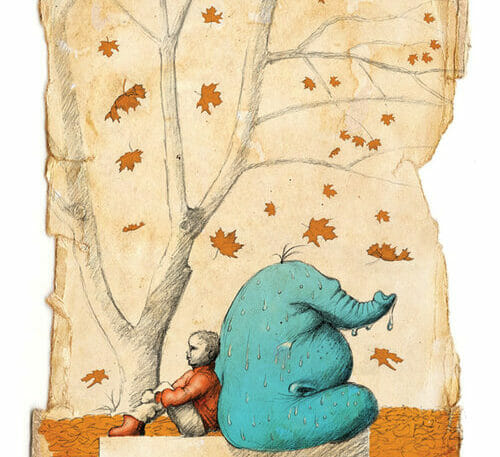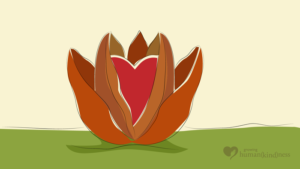Image: Befriend Sadness by Eddy Sara. Used by kind permission of the artist. You can find Eddy’s art here.
We all have moments in our lives where we feel bereft and alone – where those around us convey in word or action a lack of understanding. I think these are some of the most painful experiences of being human – of feeling isolated, unmet and unreceived.
These are often the moments when we turn to some other source of holding – some place of refuge – so we can feel less isolated, overwhelmed or frightened. These refuges are often our secret shames, our compulsions, addictions, and ‘bad habits.’
For lots of people, it’s work. For others, it’s gaming or shopping. For many, many people, it’s food.
In my life, my primary sources of holding have been food and books. Both have been dear friends, places of friendship, companionship, and understanding that have helped me feel less lonely and alone.
Books (and work) are celebrated in Western culture, so to say you’re an avid reader – or even a workaholic – is often met with praise, achievement, and worldy success.
But because ‘fatness’ is feared in most cultures, if you use food to self soothe, you may be received with more distance, ‘coolness,’ lots of solutions and fixing advice, and even aversion and disgust.
It’s part of the beautiful and intelligent wiring of our human bodies, hearts, and beings that has us seek out company and companionship when we feel overwhelmed, stressed and alone. We are wired for relationship, and we’re wired to seek out support when we’re struggling.
In a modern world where many of us feel fragmented and separated from support and love – and in a world that prizes rationality, individualism and achievement – we are all suffering from a lack of support. It’s the air that we breathe, and the sea in which we swim.
We feel this absence in big and small ways, and it can lead to a chronic sense of feeling overwhelmed, overstressed, overworked, and undersupported.
In a world wide pandemic, this is even more so.
It’s important to acknowledge this cultural and chronic lack of support so we don’t think the stress we feel (or the ‘poor’ ways we cope with stress) are personal, or a personal flaw. Rather, these are a consequence of the systems and values in our culture. And as such, they affect and impact us all.
I’ve heard from so many people how hard these past two years have been, and how much they’ve found themselves retreating to old comforts for support – media, gaming, spiritual bypassing, food, alcohol, online surfing, work, online shopping, TV, movies, and more.
And food – there have been jokes about the ‘covid 19’ and the ways people have used food to soothe the loneliness, stress and disconnection of these times.
I think of my neighbor, a dear single woman in her late 60s, who told me she’s watched more TV these past two years than she has her whole life. A TV family can feel like a substitute for the family and connections that we’ve missed with so much quarantining.
I think of a sign I saw on the marquee of a local restaurant, “I need to practice some social distancing from my fridge.”
And of course, I can see the impact in myself and within my own family, the ways all of us have coped with the pain and hardship of these times.
It’s so easy to criticize, shame, mock, and belittle ourselves – and others – for the messy or less than ideal ways we try to support ourselves when we feel overwhelmed. This is another way that our cultural conditioning appears in our daily lives – the focus on pulling ourselves up from our bootstraps, overcoming, and ‘taking control’ of our lives.
But the instinct to seek out support – no matter how messily this instinct may appear – is something to be respected, for it’s rooted in the beauty of our biology, the wisdom of our bodies, and the yearning in our hearts.
So today, I invite you – let’s pause together and reflect on the ‘messy’ ways we try to feel supported when we feel overwhelmed by our inner world, and offer ourselves respect, dignity, and understanding for these ‘not beautiful’ coping strategies.
What if we beheld the overeating, TV watching, gaming, spiritual bypassing, or shopping with compassion, with curious warmth about what drives our behavior?
Can we offer ourselves warmth: I wonder what’s going on with me, here in my inner world, that has me eating a whole pizza when I’m not that hungry, sending emails until 2 a.m., checking out, or binge watching TV for an entire Sunday afternoon?
Why is it hard for me to call a friend when I feel lonely, and I turn to food or alcohol instead?
Neuroscience educator Sarah Peyton says that the most healing and soothing experience of the brain is to be understood – to know that we make sense.
When we feel understood, something in us relaxes, exhales, and comes home.
I was curious, and so I looked up the eytemology of the word ‘understand.’ What I found brought a sense of awe to my being, and tears to my eyes. The roots of the word understand point to a feeling of ‘being close to,’ or being ‘between, or among,’ or ‘to stand in the midst of.’
To understand is to come together, to heal the separation we feel – from our hearts, from the living world, from our bodies and from each toher. To understand is to lean in, and to come close, and to allow ourselves to be changed by what we come to know more deeply.
So when we’re understood by another, when we understand ourselves, or when we give another our understanding, we are there in the midst of each other. We are close to whatever is alive for that person, or for ourselves.
We are no longer alone or separate, but companioned, and accompanied.
If there is anything I wish for you, it is that the painful and challenging behaviors and patterns in your life may be met with understanding, both within your heart, and without, from others.
This understanding is the foundation of love, and the foundation of change. When we feel understood, something in us begins to soften and melt. Perhaps it is the judgment, or anger, or resentment that melts – for oh my goodness, is it easy to feel resentful of our (and our loved ones’) behaviors that cause us so much pain!
Perhaps this is what forgiveness is, or one part of forgiveness, ‘what loosens the chains we hold of another’s guilt,’ as Neil Douglas Klotz writes about the Aramaic roots of the Lord’s Prayer.
In this melting, in this unchinking, we feel this warmth of understanding, this warmth of compassion, this warmth of mercy that helps us approach ourselves and the needs that drive us with more tending, more friendliness, more wisdom, and more love.
I end with an anecdote from Winnie the Pooh and Piglet, for Piglet intuitively gets this:
“’I don’t feel very much like Pooh today, said Pooh.
‘There there,’ said Piglet. ‘I’ll bring you tea and honey until you do.’”
Are you looking for hands on help?
If you’re looking for hands on help to soften patterns of self soothing with food and sugar, I have three do at home courses that are a helpful and gentle source of support.
People are currently going through these courses and are receiving so much help from them! I’m active in the comments and enjoy supporting you in this way.
Emerge: Create a New Habit may be for you if you self soothe with sugar and want gentle, compassionate help to set limits with the amount of sugar you eat.
Align: Heal your battle with your Inner Rebel may be for you if you struggle with resistance and parts of you that say ‘no’ when you try to set limits or make changes.
And The Heart of Food is helpful if you have a lot of anxiety about your overeating and you want to start to understand the drives underneath.
You can find all three do at home courses here.
Please reach out if you have any questions – I want you to find the support you need, whether it’s with me or another resource.
To the places in you that long for understanding, and for the understanding that helps us all come home, Karly

